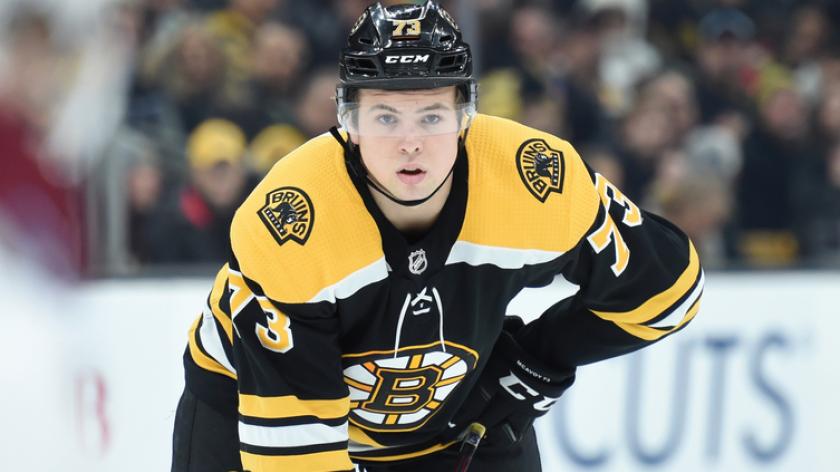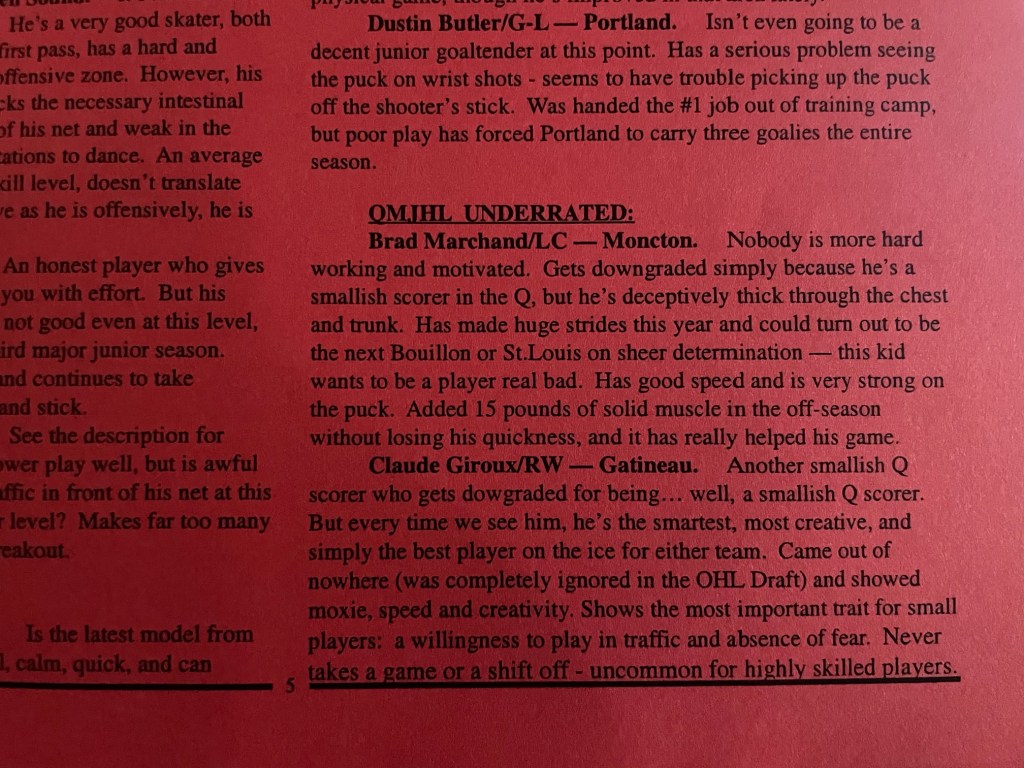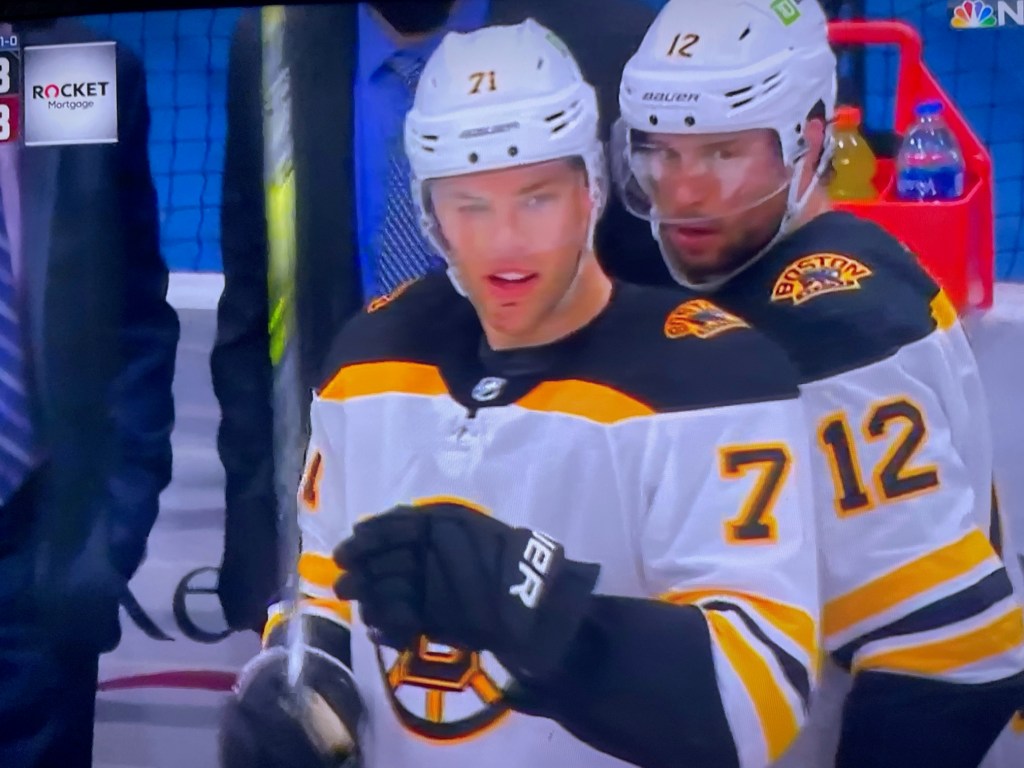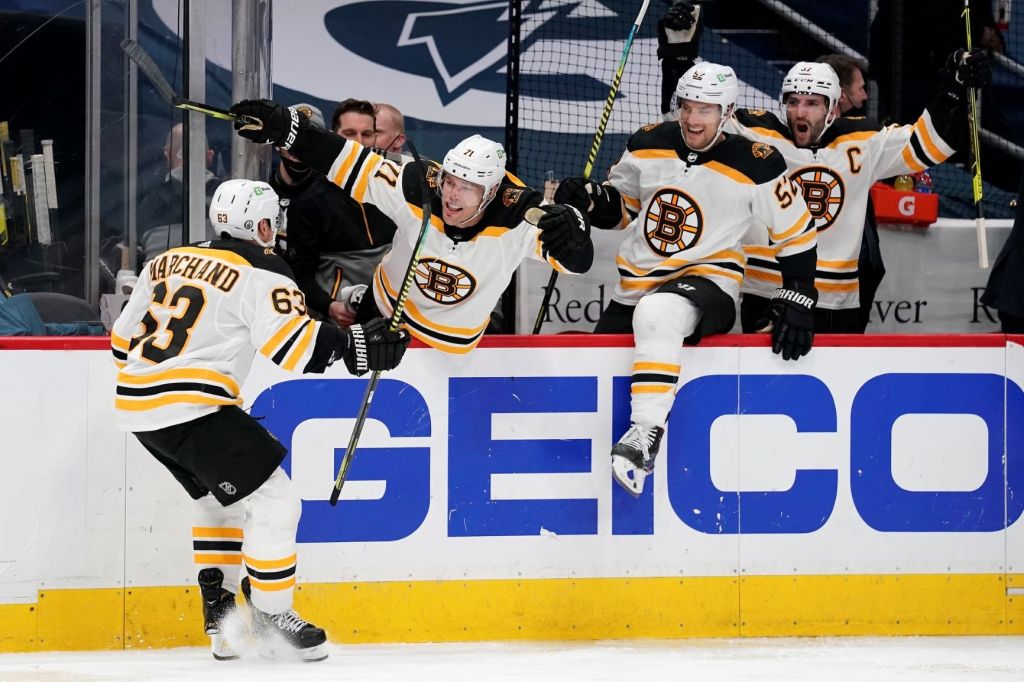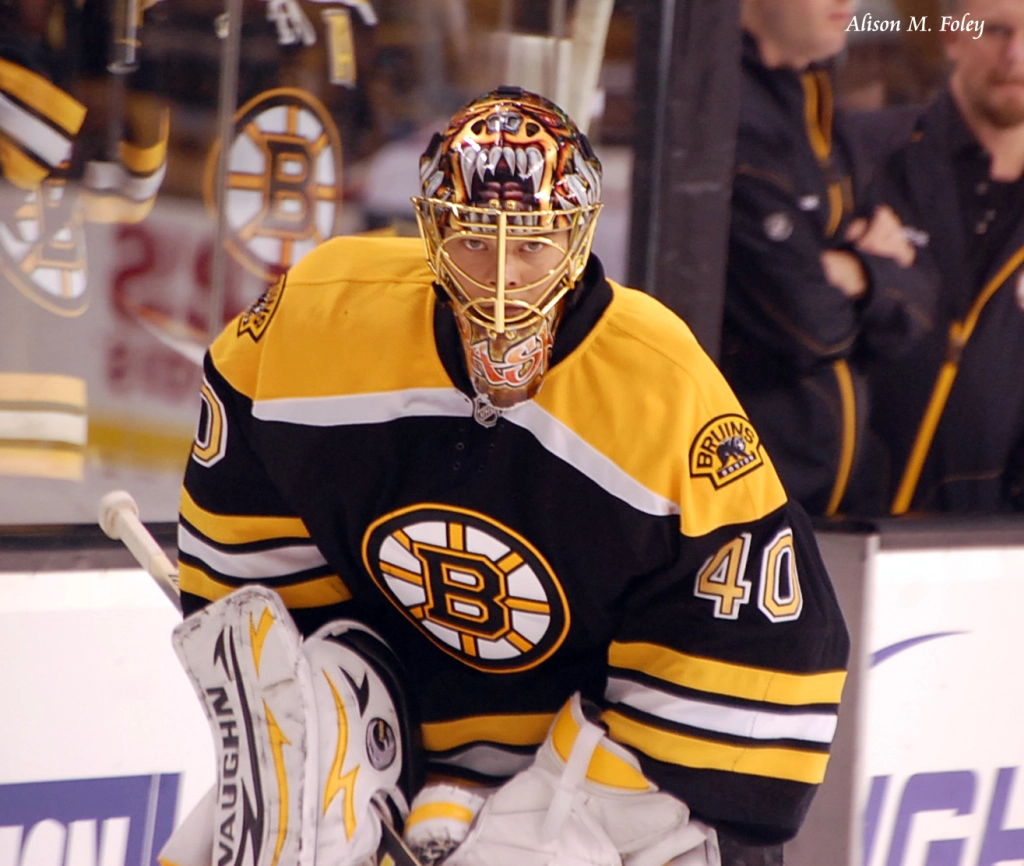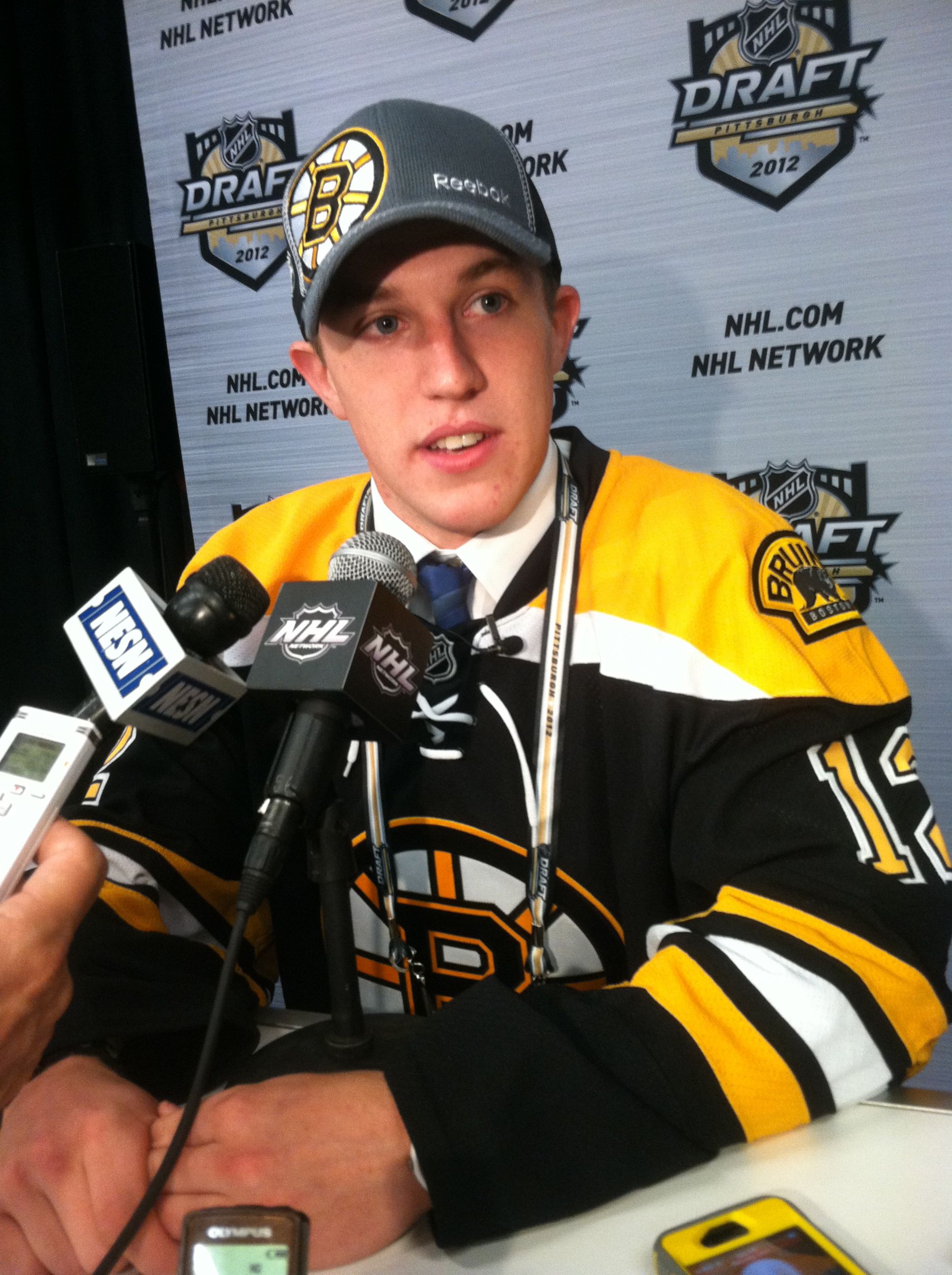
The Boston Bruins won their fourth straight game Sunday in the opening round of the 2021 NHL Playoffs, winning 2 out of 3 games on the road to eliminate the Washington Capitals by a 3-1 score.
Led by captain and future first-ballot Hockey Hall of Fame tenant Patrice Bergeron (two goals) and Tuukka Rask (40 saves), the B’s made it look easy in a game that could have gone the other way.
After taking a 2-0 lead into the third period, Conor Sheary scored 11 seconds in to give his club some hope, but Bergeron answered later in the period with his second tally of the contest. Although Lars Eller appeared to have scored a few minutes later to pull the Caps again to within one, the goal was disallowed on the ice due to goalie interference by Evgeni Kuznetsov.
The game completed an impressive surge for the Bruins, needing overtime to win their first two contests of the series, but then handling business in wins 3 and 4 to finish them off.
The 2018 Stanley Cup champion Capitals, who took Game 1 in overtime on a Nic Dowd deflection goal, went out with a whimper. Few of the core members of that championship squad stepped up to accomplish much of anything in the series loss, leaving it to the bottom two lines and role players to get the bulk of Washington’s production.
It was bittersweet for many fans to see Zdeno Chara go through the handshake line wearing Washington red and seeing his 23rd NHL seasons come to an end. He was capable in the series, but not a difference-maker for the Capitals and the B’s had success by putting pucks behind him and forcing him to turn, skate and defend under pressure. It’s a shame he didn’t stay in Boston and was on the other side of the result, but at the same time- what’s the point in having such a debate? He opted to go where he felt he could have a bigger role, and the Bruins opted not to do what it took to keep him. Hockey is a business, and if you didn’t believe that, then look no further than what transpired between the B’s and their former captain. In the end, both positions should be respected, and in this case- Chara now gets to rejoin his family in Boston while his former teammates await their next opponent.
Here are some thoughts on the highlights and lowlights:
UP
1. Tuukka Rask Boston’s wins leader dropped Game 1 and took heat for allowing the winning score, but was near-perfect the rest of the way, posting a .940 save percentage in the four victories and raising his career postseason save percentage to .927 (75 games minimum) in 98 career games, good for No. 1 in NHL history (for now). He’s healthy and has his patented swagger back. In Game 5, the Bruins were outshot by a wide margin, but he made it look easy. In his final two starts, he stifled the Caps at nearly every turn, and it was his ability to make the big saves in the overtime games 2 and 3 that allowed his club to take control of the series. We recognize that there are some out there who are simply never going to get on board with Rask, but in this case, we’re giving full credit where due.
2. Patrice Bergeron The captain presided over his first playoff series win with the Bruins wearing the ‘C’ and led by example by potting two goals, including the winner. Boston fans have been spoiled by his 18 years of excellence in the Black and Gold. Remember, he came in and made the team as an 18-year-old, looking like a seasoned veteran. That seems like a lifetime ago, and while he’s never put up an 80-point regular season, he’s been the model of consistency and success as this generation’s greatest two-way center who can do it all, even if he lacks the pure production of other NHL super stars. To put it another way, if you’re in overtime of a Game 7 final series for all the marbles, who do you want as your center over Bergeron? There aren’t many names you can come up with if you’re being intellectually honest in that exercise. The veteran who grew up in Quebec City admiring Joe Sakic, has cemented a similar legacy of greatness like his idol, all accomplished with the franchise that drafted him in 2003. His 44 postseason goals are the most among active players for the team, and his 115 points trail David Krejci by just two. For the record, Ray Bourque is the team’s all-time playoff scoring leader with 161 points, but Bergeron and Krejci have all surpassed franchise icons like Phil Esposito, Johnny Bucyk and Rick Middleton.
3. Charlie McAvoy As the series went on, Boston’s top defenseman asserted himself more and more. When he turns the wheel and plays his best hockey, he can impact the game positively in all zones. His three power play assists in Game 4 was instrumental in giving the Capitals a spirit-crushing loss and setting the stage for Game 5, and McAvoy’s ability to log big minutes in all situations makes him the latest in a long line of top blue liners who have worn the spoked B. He’s still prone to turning pucks over because he wants to push the envelope at times with more risk in his play than he should, but the aggression is good, and as the old saying goes, you can tame a tiger but you can’t paint stripes on a pussycat and expect it to rule the jungle. His next contract is going to be a big one, so get ready for that, but to the young former Boston University product’s credit, he’s earning it. Every top team needs a bell cow defenseman, and McAvoy stepped out of Chara’s shadow in this series to assume that responsibility. So far, so good.
4. Brad Marchand The 21st century version of Ken Linseman built a reputation with his antics, but in recent seasons toned his act down. When his abrasiveness threatened to cross the line and put his team at a disadvantage, Marchand pulled it together (assist to Bergeron, btw) and scored two critical goals to get his club back in control of the series. His three goals in 5 games led the B’s, but it speaks to his MVP-worthy season that he’s been able to keep the scoring going after finishing third in the regular campaign with 29 goals and 69 points in 53 games. His overtime one-timer in Game 2 came just 39 seconds into the extra frame and set a franchise record, breaking Bobby Orr’s famous flying Mother’s Day tally to win the Bruins the 1970 Stanley Cup. That alone deserves recognition on this list, but Marchand played hard, fast and put his team first when he had to. That’s a sign of his veteran maturity and ability to understand how fine a line it is, making sure he stayed on the right side of things to secure another series victory. With 98 career points, Marchand is close to joining Bergeron and David Krejci in the Playoff Century Club.
4. Taylor Hall Since the B’s acquired the 2010 first overall selection at the trade deadline, the team has gone 16-4-2 with No. 71 in the lineup. He scored what is arguably the biggest goal of the series late in the third period of Game 2 as the B’s were down 3-2 with the seconds ticking off the clock towards a crushing 0-2 series deficit. Then, Hall flashed his trademark speed to grab the puck and gain the offensive zone, flying past Washington’s top D John Carlson, and sending it to the front of the net. He then circled the cage, located the puck lying in the paint amidst player-induced chaos in the crease, and jammed at it until it went in. The speed, pace and skill Hall brings when he’s on top of his game is something not seen in Boston very often, and his presence has electrified the offense and second line. He didn’t always play his best hockey throughout the series, so there’s definitely room for improvement, but he came through in the clutch with a critical goal when his team needed it the most. It sure looks like the B’s will be able to find a way to extend the pending unrestricted free agent when the time comes (be patient- the expansion draft complicates things and stow the fast food mentality to get something done now). We’ll leave that to Don Sweeney and his capologist Evan Gold to sort out, but Hall is proving himself to be a valuable commodity, and the veteran is enjoying the kind of success he’s having as the right kind of fit at this stage of his professional career.
5. Connor Clifton When Jeremy Lauzon went out of the lineup early in the series with a hand injury suffered in Game 1, it opened the door for Clifton, who in his third playoff spring with the Bruins, has once again elevated his play when it matters most by eclipsing his up-and-down regular season performances. The small but speedy and physical New Jersey native drew the tough assignment of containing Alex Ovechkin and sent a message in his first game against No. 8, hitting him, disrupting his rhythm and blocking his shots. His stats line of no points in 4 games doesn’t tell the story, but Clifton was able to stabilize the left side and make an impact with his fast, hard play. He shined in Game 4 on one particular penalty kill when he blocked three big shots in the same sequence. Players love that stuff, and Clifton is clearly a big man trapped in a small man’s body. The ability to play your best hockey when the games get so much faster and tougher is the sign of a true competitor.
6. David Pastrnak After getting off to a sluggish start, Boston’s most skilled scoring forward racked up 4 points in his final two games, ending the series on the top with 6 points in 5 games. His goal to break the scoreless tie in the second period of Game 5 was a thing of beauty as he went through the legs to avoid Dowd, then beat defenseman Nick Jensen to the front of the net and tuck the puck inside the far post. Though Pastrnak struggled late in the season and his 20 goals in 48 games was well off his 48 goals in 70 from a year ago, he’s getting his confidence and swagger back. When Pastrnak is going, the B’s can skate with the best offensive clubs in the NHL because they have the speed and depth to do it.
7. Bruce Cassidy Let’s face it- the man can coach a hockey team. His winning percentage with the Bruins since taking over for Claude Julien in 2017 is north of .650, and his 2019 club came to within one victory of the ultimate prize. He’s a student of the game who has built a winning culture through structure, discipline/buy-in and by demanding accountability, starting with himself and his staff. He’s an astute game manager who made the right adjustments throughout the series and did a good job with handling injuries to the club throughout the season and the playoff carryover. He’s learned a great deal since failing with the Washington Capitals, so you know this series win felt so good for him to beat his old team. He wasn’t ready to be a NHL head coach when the Capitals hired him in 2002, but in the years since his firing in 2004 and when he got the Boston job 13 years later, he learned from his past experiences. Cassidy consistently presides over winning teams because he employs the right kind of structure, motivation and leadership. Coaching a professional hockey is no easy task if you expect to do it right and achieve top success, but one of the most important aspects of it is that the players will show up every night and play hard for you. That just doesn’t happen by being a nice guy- they have to respect your knowledge of the game, connect with you personally and believe that by buying in to your systems and methods, they will have the best chance at capturing a championship. Cassidy has done that in Boston, and the way his team took control of the series after a devastating Game 1 loss has reinforced his mettle behind the bench along with the contributions of his staff to the entire process.
8. Jake DeBrusk When the top guns were struggling to find their offense, it was DeBrusk who came forward. Although he didn’t sustain the scoring as Boston started racking up the wins, he used his speed and played with energy and effort to be a disruptive force, create chances and back check with authority to prevent opportunities on his own net. It hasn’t been a good year for him, but instead of pouting and continuing to be a black hole, the 23-year-old put up a respectable 2 goals and 3 points while showing he can be an effective 200-foot player when he sets his mind to it. That, more than anything, could be a key factor in getting his career back on the rails after his confidence took a big hit.
9. Ilya Samsonov The Russian rookie showed why he was a first-round pick a few years ago by playing hard and keeping the Bruins from turning the series into a blood bath on the scoreboard in Games 3 and 4. He has tremendous ability, though he did whiff on Bergeron’s first goal of Game 5- a shot he needed to stop. His ability to move laterally and locate/track pucks is elite. On the downside, Samsonov reportedly got into some hot water with his off-ice conduct, landing him in COVID-19 jail, which hurt his standing with his team and fans a bit. However, in watching him from a pure hockey standpoint, as he matures and gains experience, he will make the Capitals a better team in the net if he can maintain his focus and learn from mistakes.
DOWN
1. Nicklas Backstrom The long time superstar center was, to put it mildly, putrid in this series and in his last two playoff years, has produced just two assists in 10 games. It isn’t just the lack of scoring- he was on the perimeter a lot and looked and played soft. For a player of his caliber, that is unacceptable, and barring some kind of injury he’s dealing with the Capitals and their fans are right to demand accountability from him for two years of no-shows after being such a critical cog in that machine for so long.
2. Evgeni Kuznetsov In a word, gross. This player is far too talented to put up the zero of a performance he did. From missing the first two games because of being in COVID protocol, to barely making a ripple on the pace and flow of the games as the series went on, going pointless. He had a poor year overall, and looked at times like he was just punching the time card. All of this from a guy who had 32 points the year the Capitals won it all. It looks like his days in Washington may be numbered, as the team and GM Brian MacLellan may decide to go in a different direction in building the next roster.
3. Peter Laviolette If Cassidy showed you what right looked like in a coach, Laviolette’s performance in his first playoffs with the Capitals was found to be…wanting. For whatever reason, he was unable to get top performances out of his best players, and it showed in the lackluster power play and the inability for Laviolette to get what had been the third-best PP unit in the regular season going with any kind of consistency. The reality is- if that power play is even half as better than it was, with all the penalties the Bruins took, it could have been a whole different series. Whatever the reason, the perception from afar was that his team just wasn’t in synch and following the program. The Franklin, Mass. product is a winning coach with one ring in Carolina and two more trips to the Stanley Cup final with the Flyers and Predators, but he looked overmatched and not up to the task in this one. To be honest, the team didn’t exactly do their part either.
4. Tom Wilson The NHL’s lightning rod has a world of talent, but diminishes himself with unnecessary self-sabotage instead of just playing the game hard…and the right way. Look, just about everybody respects hard skill and being tough to play against, and there’s no doubt that every team would love a Wilson on their roster, but this playoff version scored the first goal, and then went largely MIA, unless he was doing things that were either cheap/unwarranted or hurt his team. Unlike Marchand, Wilson has yet to figure out that he needs to let his offensive play do the talking rather allowing himself to become a distraction by being…offensive. And the Capitals as an organization have their own role to play as enablers- from the GM and coaches to even the social media staff- they have encouraged Wilson’s buffoonery, instead of realizing that when focused and on his game, he’s a lethal weapon, and getting him to play more of a ‘we’ game than a ‘look at me’ game. Wilson needs to step back and look in the mirror at the farce of a player he ended up being in this series, but so should the rest of the Caps- they allowed it to happen.
5. Boston Bruins team discipline A largely ineffective Washington power play prevented a closer-run series, but the B’s on the whole are going to have to clean up their penalty game going forward. Sure, some of the calls went from silly (Marchand’s roughing call in Game 5) to egregious (Washington getting a PP after Wilson cross-checked Nick Ritchie from behind after Charlie Coyle’s goal in Game 4), but that doesn’t change the fact that too many penalties that went against the B’s were self-inflicted through lapses in attention and discipline. Fans have been watching this team long enough to know that Boston doesn’t often get the benefit of the doubt from officials, so the players will have to put extra attention in avoiding the lazy stick fouls from not moving their feet, control their lumber so as not to draw high-sticking infractions and generally do a better job of staying out of the box. The penalty killing units (led by Rask) did their job, but its going to catch up with them in the next round if it continues.
6. Nick Ritchie Let’s face it- he’s capable of a lot more and the team needs it from the ‘Big Rig.’ He did have a glittering scoring chance in Game 5 on a between-the-hashmarks laser that Samsonov picked up and stopped as he slid laterally to absorb the puck in his pants, but other than a deflected shot on the PP off him and into the net in Game 1, Ritchie didn’t get a whole lot accomplished despite a respectable 3 points in the 5 games. He’s got to get to the net more often and with greater urgency and authority. When he drives the net, he’s a load to contain and with his hands and ability to finish plays in tight spaces, the chances will be had if he turns the wheel more.
7. David Krejci This is not a knock on Krejci, as there were times he showed his experience and made some savvy plays offensively and defensively. But there were a few examples where he was off in his play, especially handling passes cleanly on the PP and protecting the puck in tight spots like he so often does. The purpose of putting him here in the down section is not to criticize, but to point out that the Bruins won four games in a row without much of a contribution from No. 46. We all know that his best hockey comes out in the spring months, so this is an acknowledgement of that and the fact that for the B’s to keep advancing in the postseason, they will need more out of their No. 2 center.
We could go on, but time to leave it here.
The Bruins will now get some time to rest, heal and await their next opponent, be it the Pittsburgh Penguins or New York Islanders.
For more insights on the Bruins/NHL and hockey in general, follow me on Twitter at @kluedeke29
